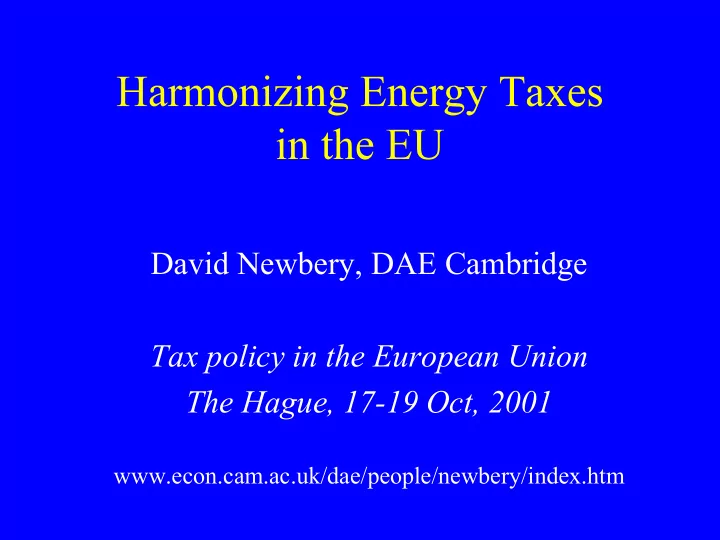

David Newbery, DAE Cambridge Tax policy in the European Union The Hague, 17-19 Oct, 2001 www.econ.cam.ac.uk/dae/people/newbery/index.htm
• by fuel within each country • for each fuel across countries • Why is energy taxed at all? • Why should rates vary so much? • Are the rates efficiently set? • Should they be the same across the EU? 1
Average mineral oil excise 1997 Eurs/Tonne oil equivalent revenue/GDP percent 400 3 2.5 300 2 200 1.5 1 100 0.5 0 0 BE ES LU IE PT EL NL AT DK DE FR FI SE UK IT AV Tax/tonne LHS Tax/GDP RHS 2 EC Excise Tax Duty Tables, July 2001 ranked by tax rate
Tax rates on industrial fuels EU 1997, excluding VAT Netherlands Luxemburg Belgium Denmark Austria Germany UK Ireland Sweden Finland Spain France Portugal Greece Italy average 0 50 100 150 200 percentage HFO LFO gas coal electricity IEA Energy Prices and Taxes 3 ranked by tax on LFO
Effective tax rates on domestic fuel EU 1997, net of standard VAT Luxemburg Belgium UK Ireland Germany Finland Austria France Netherlands Spain Denmark Portugal Sweden Greece Italy Average -50 0 0 50 100 150 200 250 4 percentages
5
6
Effective road fuel tax rates EU 1997, net of standard VAT Ireland Austria Sweden Luxemburg Spain Portugal Belgium Finland Greece Netherlands Denmark Germany Italy France UK Wted avg. 0 50 100 150 200 250 300 350 percentage 7 Diesel Gasoline (unleaded)
8
• No input taxes (Diamond-Mirrlees) – unless there are market failures: – Environmental damage – Global warming – Second-best arguments – Tax evasion reasons – Optimal import taxes? – Security of supply? 9
• fuel taxes poor at efficient pricing – congestion costs vary by factor of 100:1 – fuel consumption varies by 3.5:1 • set at right level and rebalance when road pricing feasible • charges for roads analogous to charges for other infrastructure: pipelines and grids 10
• cover Opex, interest and dep of capital • in GB, perhaps 4 eurocents/km • depressed by road under-supply � Eur 400/’000 litres gasoline • EU avg ex-UK (2001) = Eur 531; UK 815 � Eur 500+/’000 litres diesel • EU avg ex-UK Eur 363; UK 865 11
• carbon taxes perfect instrument • other emissions depend on fuel, place, time • input taxes if outputs not observable – but for large plant SO 2 and NO x are tradable – impractical for vehicles, small plant – set standards, tax inputs 12
• Invoked to justify high taxes • to be credible need to be: Distinct: from other components of tax Non-discriminatory: apply to all uses Quantified: defensibly measured But road pollution small part of whole 13
Sources of Air Pollution UK 1991 percentages 100 80 60 40 20 0 SO2 NOx TSP VOCs CO2 Power Oth. Ind. Road Dom/comm Other 14 Digest of Environmental Protection and
Distinct: from road charges to allow rebalancing Quantified: defensibly measured • measured by QALYs: ~ 4-6 months • QALY ~ Eur 50-80K • suggests very low costs per km: < 0.1 cents/km, c.f. earlier estimates 6 c/km! 15
• part of collective plan or individually rational - high or low? • Tax for global optimum ~ Eur 10-220/tC • Marginal cost now ~ Eur 110/tC (+/- 50%) • Old EU carbon tax = $10/bbl =Eur 100/tC � Eur 49/’000 l gasoline; 53 diesel; 57 LFO � 17%; 22% and 315% of EC minimum taxes 16
• nominally untaxed except in DK, FI • in past coal mining heavily subsidised • 1991 producer subsidy equivalent: – 50% UK, 250% Germany, 450% Spain • supported by high final prices • now largely ended – but UK gas moritorium, Climate Change Levy • proposed carbon tax = Eur 67/ tonne 17
• optimal import tax for oil? • Highest HC taxes in oil exporters! • Tricky issues of credibility, commitment • tax to reduce import dependence? • But gas largely untaxed 18
• tax use of large envy-making cars • easier to tax energy than final goods – esp in Mediterranean countries • domestic energy use income inelastic • fuel poverty (>10% income) = 20% UK • LFO heavily taxed in IT, Greece, SE, DK 19
• reduce trade distortions and tax arbitrage � concentrate on production • Energy Security: do taxes distort choices? – Generation: coal favoured in DK, IT, (DE) – industrial steam raising: same – domestic space heating: gas over LFO in IE, ES – car: diesel over gasoline in BE, FR, DE, SE 20
Generation in England and Wales by fuel type TWh 350 300 imports 250 hydro+other 200 CCGT other steam 150 Coal Nuclear 100 50 0 21 1990 1992 1994 1996 1998 2000
• merit order of existing power stations • might be more serious if gas prices rise • “dash for gas” - 25% of GB now CCGT • road haulage distorted - use vignettes? • but overall not very significant? 22
• opportunity to rationalise energy taxes � carbon tax as base, not HC taxes • result likely to be more uniform • 2001: EC adopts Transport White Paper – argues strongly for harmonizing haulage fuel – for better infrastructure and emissions charges – for raising diesel prices, lower UK gasoline • likely to be political dynamite 23
David Newbery, DAE Cambridge Tax policy in the European Union The Hague, 17-19 Oct, 2001 www.econ.cam.ac.uk/dae/people/newbery/index.htm
25
26
27
Recommend
More recommend